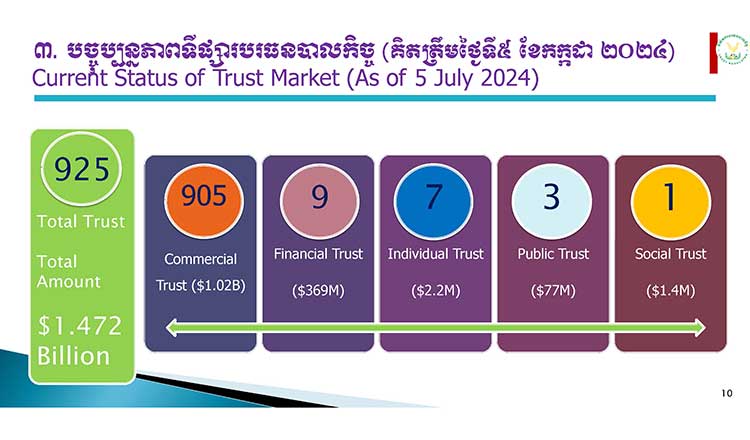Cambodian Trust Sector Continues To See Growth - Commercial Trusts Lead The Way

The trust sector in Cambodia has continued to see growth since the Trust Law was passed in 2019, with the Trust Regulator’s (TR) latest update indicating that Cambodia’s trust market has reached a value of USD $1.47 billion by July 2024, with the majority tied up in commercial trusts.
In February 2024, we provided the latest updates on the main questions surrounding Trusts in Cambodia, as well as the key opportunities and challenges in the Kingdom's Trust sector.
Of the total in July 2024, nearly USD $1.02 billion is in commercial trusts, USD $369 million in financial trusts, USD$2.2 million in individual trusts, USD $77 million in public trusts and only USD $1.4 million in social trusts.
Interestingly the latest report from the Trust Regulator also indicated that there is investor confidence in the use of escrow services by the 19 viable commercial banks in Cambodia, and as many as 148 trust cases to the value of USD $209 million have made use of the escrow services.
A trust, based on the local law, is defined as “an entity recognised by the law in which a trustee holds legal title to the property to benefit the beneficiaries who have an equitable interest in the trust property”, according to Dr. Virak Prum, Chairman and Law Professor of CamEd Business School
Under Cambodia’s Trust Law of 2019 and Prakas No. 003 (January 26, 2023), there are five types of generic trusts:
- Public Trust;
- Commercial Trust;
- Social Trust;
- Individual Trust;
- Financing Trust (which existed before 2019 but has since been integrated into the trust law).

Growth of Cambodia’s Trust Sector
Trust Regulator (TR) Director-General Sok Dara previously stated he was confident in the increase of the value in the Cambodian Trust market which would be worth billions of dollars, and rise to as much as USD $1.5 billion by the close of 2023. He was not far off, as that figure has nearly been reached in Q3 2024.
- 2019 - Trust Law passed in Cambodia
- 2021 - There were only 17 registered Trusts in Cambodia accounting for a total of USD $166 million in assets.
- 2022 - The value of funds invested in the various Cambodian Trusts nearly doubled.
- September 2023 - The Trust market was worth approximately USD $1.1 billion with more than 500 registered Trusts in Cambodia,
- January 2024 - Cambodia’s Trust sector included 810 registered cases, accounting for USD $1.29 billion worth of assets
- July 2024 - The Trust sector was worth USD $1.47 billion and included 925 registered Trusts.
Challenges Cambodia’s Trust Sector Faces
Cambodian trusts have been seen to be a way for foreigners to inadvertently legally own land through trust funds as foreigners can’t own land outright in most cases. This seems to remain a grey area but the TR said in the latest report that of market participants a high percentage of funds invested in trusts in Cambodia came from foreigners using the trust route to invest in Cambodia, and in some cases, in land.
In May 2023, the Trust Regulator said that land and immovable property had experienced the biggest growth since the Trust Regulations came into effect.
There are other perceived challenges in the Cambodian Trust sector:
- Navigating the mandatory registration system imposed upon trustors and trustees is seen as cumbersome.
- The language used in the trust deed or contract needs to be clear, otherwise, it can lead to conflicts or disputes.
- A spendthrift clause, which could prevent the beneficiary from selling or giving away their equitable interest in a trust property, can create conflict with potential creditors of the beneficiary;
- The current tax regime for trusts in Cambodia is not clear and there is no separate tax regime applied to trusts.
In August 2024, Sok Dara (who is also a member of the Steering Committee for Financial Sector Development) took part in the final draft of the Financial Sector Development Strategy 2021-2030 meeting at the National Bank of Cambodia under the chairmanship of H.E. Dr. Chea Serey, Governor of the National Bank of Cambodia. This policy, once approved, may shed further light on these issues.